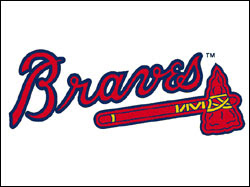It has been stated, mostly by critics pre-disposed to rooting against Braves, that Atlanta's actions prior to the Trade Deadline were born of desperation and will eventually come back to haunt them. The same voices that argued that Braves fans overvalued their own prospects to a ridiculous degree soon warned against the loss of those very same players once they were members of different organizations. Many simply considered the speculated talent of the group dealt away without considering their specific worth to Atlanta or even the true depth of the returns, but I would now like to take the final steps towards correcting that misconception as we look at what was given up for this likely final, two-year playoff run with our current headlining stable of veterans.
Jarrod Saltalamacchia was the centerpiece of the package shipped to Texas as part of this Deadline's biggest trade and it's easy to see why. The 21-year-old is a switch-hitter with plus power and solid contact. He also happens to play at a position of depleted talent around the majors: catcher. In fact, I suspect that he should be among the 5 best in MLB at that spot before the end of the decade. The principle reason for caution among critics is his deficient 2006 campaign at the Braves AA affiliate in Mississippi, something that has been credited to a lingering injury and clearly reversed earlier this year once he was proven healthy. Others will point to his unspectacular .822 OPS in the minors as proof that he is mostly hype, but that includes two weak seasons as a 17 and 18 year-old, as well as the aforementioned injury-plagued 2006. All in all, I think it's fair to say that the Rangers acquired a budding superstar in the player affectionately referred to as Salty. That said, Atlanta has their own youthful All-Star at the position.
Elvis Andrus was perhaps the second most notable name sent to Texas in this deal, though his projectability is the most debatable. The 19-year-old prospect has been called a phenom by some, but is yet to prove much of anything as a pro. He's been younger than most at every level so far in his ascent through the organization, but he hasn't replicated even his moderate success in the Rookie League two years ago. His most notable attributes are his speed and defense, though he's expected to develop plus contact and some power. Factoring into Atlanta's decision to trade Elvis is the fact that SS is their deepest position as an organization and he was the one farthest from contributing to the big league club. Moreover, he might simply not have been progressing as well/quickly as the Braves had hoped and they figured his value in a trade now was higher than as a player were he to remain with the franchise.
Matt Harrisonbegan the season as the Braves undisputed top pitching prospect, but he was matched by Jo-Jo Reyes and surpassed by Dan Smith in Mississippi this season. By the time of the trade, Harrison was still in AA while Smith had moved up to AAA and Reyes was pitching in Atlanta. Sure, Dan and Jo-Jo have struggled at the higher levels, but Matt didn't even get called up. Injury concerns further damage the outlook for a starter that was not dominate outside of A-ball. The Braves have plenty of lefty starters at his same level and, when it's all said and done, I doubt his absence will be felt as much of a loss in Atlanta.
The two other pitchers that the Rangers acquired (Neftali Feliz and Beau Jones) were less well-known, but perhaps better than the others in this package not nicknamed Salty. Though they are still years away from making an impact at the major-league level, they've each shown glimpses of excellence and Neftali managed to sustain that this year. Power pitchers alike, I personally think that Feliz will be a smashing success while Jones might not make it. If the Braves had not accumulated so much similar depth in arms, these two losses might have hurt the most.
Finally, GM John Schuerholz made a deal with Kevin Towers of the Padres in which he gave up a troubled lefty starter allegedly masquerading as a reliever (Wilfredo Ledezma) and a popular southpaw RP prospect (Will Startup) for added bullpen depth. I will never understand the trade that brought Ledezma to Atlanta in the first place, but I'm glad he's gone and that the Braves received something potentially useful in return. That return, however, was due to the other name in the deal that, while fictitious-sounding, belongs to a real-deal prospect. While not being exactly what the Braves needed in Atlanta now, Startup is likely to be a solid pro. Some believe that he doesn't have the stuff to make it, but I like to think that he has what it takes to work around that deficiency. Nevertheless, Atlanta is not likely to miss him due to the depth of relief arms mentioned above.
All in all, the Braves surrendered a staggering amount of prospects in return for a handful of veterans in moves that are geared towards winning now. Regardless of that fact, Atlanta's future is not in jeopardy because of these trades. We have glanced at the benefit of the additions and the cost of acquiring them, in the final installment of this Trade Deadline series I will breakdown the team's outlook in both the short and long terms. I hope you decide to come back for that as I look forward to writing it!
Saturday, August 4
Atlanta Gets Better, But At What Cost?
Posted by
Ernesto Ruiz
at
2:15 PM
![]()
Subscribe to:
Post Comments (Atom)

No comments:
Post a Comment